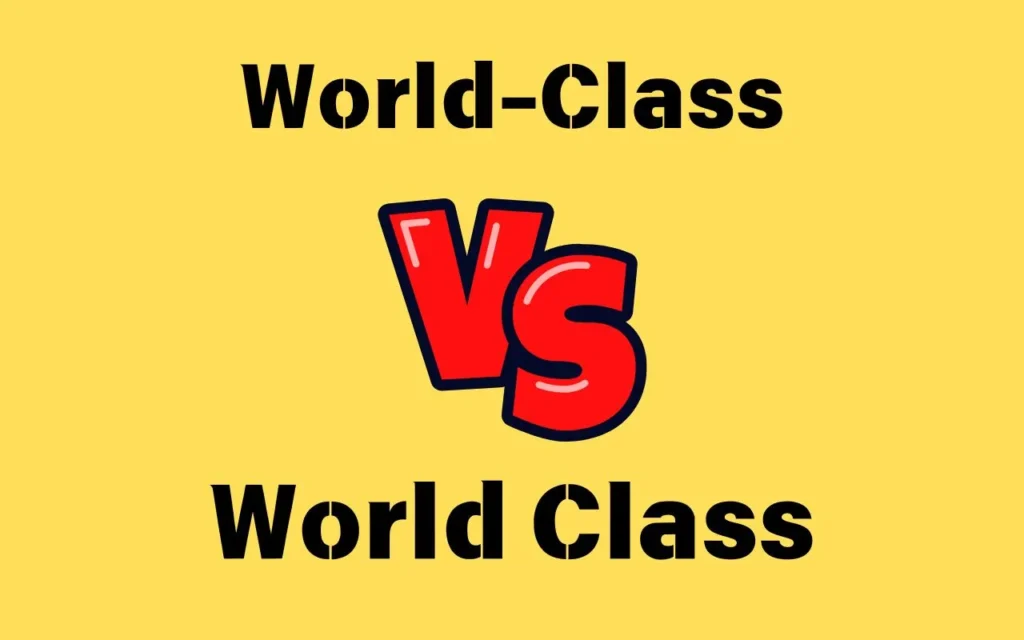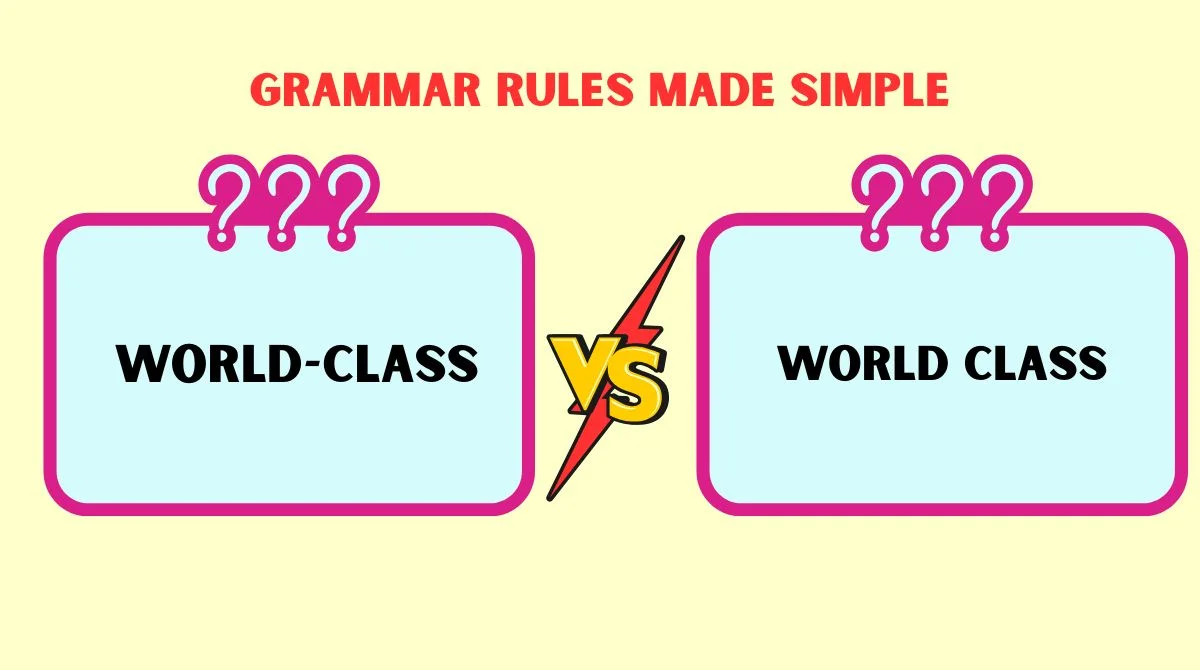Last updated on September 26th, 2025 at 03:12 pm
Language has a way of tripping us up with the smallest details. One little hyphen can change the entire role of a word in a sentence. A perfect example is the confusion between “world-class” and “world class.”
At first glance, they look almost identical, but writers, students, and professionals often wonder: When should I use “world-class” with a hyphen, and when should it be written as two words?
This article clears up the confusion with grammar rules, real-life examples, and expert writing guidelines. By the end, you’ll not only know the difference but also feel confident applying it in everything from academic papers to resumes and marketing copy.
Understanding “World-Class” vs “World Class”

The distinction comes down to grammar function and hyphenation rules.
- World-class (with a hyphen): Functions as an adjective, modifying a noun. Example: She delivered a world-class performance.
- World class (two words): Functions as a noun phrase, referring to a level of excellence itself. Example: His skills are world class.
Here’s a quick comparison:
| Form | Grammar Function | Example Sentence | Notes |
|---|---|---|---|
| World-class | Adjective (modifies a noun) | She runs a world-class restaurant. | Always hyphenated before the noun. |
| World class | Noun phrase | His talent is world class. | No hyphen when standing alone. |
Key takeaway: The hyphen isn’t optional. It signals whether you’re using the phrase to describe (adjective) or to define (noun phrase).
“World-Class” as an Adjective
When “world-class” is used to describe something else, it acts as a compound adjective. In grammar, compound adjectives that come before a noun almost always need a hyphen.
Correct examples:
- A world-class university attracts students globally.
- The chef prepared a world-class meal.
- They hired a world-class team of engineers.
Incorrect examples:
- A world class university attracts students globally. (missing hyphen)
- The chef prepared a world class meal. (ambiguous, looks sloppy)
Style Guide Notes:
- AP Stylebook: Requires the hyphen in “world-class” when used as an adjective.
- Chicago Manual of Style: Also supports hyphenation for clarity in compound adjectives.
- Oxford Style Guide: Recommends consistency, advising “world-class” before nouns.
Why it matters: Without the hyphen, a reader may stumble or misinterpret the meaning. Hyphenation eliminates doubt and shows precision.
“World Class” as a Noun Phrase
Now let’s shift focus. When “world class” stands on its own, it’s not describing a noun but acting as one.
Correct examples:
- His stamina is world class.
- The movie’s cinematography is simply world class.
- In sports, few players can reach world class levels.
Incorrect examples:
- His stamina is world-class. (hyphen unnecessary, creates awkwardness)
- The movie’s cinematography is world-class. (again, wrong since it follows the verb is)
Edge case: Both can appear in the same sentence but in different roles.
- She gave a world-class presentation, proving her skills are world class.
Here, the first is an adjective (modifies “presentation”), and the second is a noun phrase (describes “skills”).
Why “World-Class” Is Not a Verb
Many people mistakenly treat “world-class” or “world class” like a verb, as in:
- He world-classed the competition. ❌
This is grammatically incorrect. Neither form can function as a verb. Instead, writers should use:
- He achieved world-class status.
- She rose to a world-class level.
- The team reached world-class standards.
It’s a descriptive phrase, never an action word.
Grammar and Hyphenation Rules
To understand “world-class,” it helps to look at broader compound adjective rules.
- Hyphen before a noun:
- She owns a well-known company.
- They stayed in a five-star hotel.
- He joined a world-class orchestra.
- No hyphen after the noun:
- The company is well known.
- The hotel is five star.
- His talent is world class.
UK vs US English
While both US and UK English agree on the hyphen, there are small style differences:
| Region | Preferred Form | Example |
|---|---|---|
| US English | “world-class” as adjective; “world class” as noun | Harvard is a world-class university. |
| UK English | Same rule, but UK writing sometimes retains hyphen in more cases for clarity | Oxford produces world-class research, and its standards are world class. |
In practice, both regions agree: hyphen when it comes before a noun, no hyphen when it stands alone.
Practical Writing Guidelines
Here’s how to decide in real writing situations:
- Use “world-class” with a hyphen when it directly modifies a noun:
- A world-class athlete
- A world-class strategy
- Use “world class” (no hyphen) when it describes excellence after a verb:
- Her skills are world class.
- This event is world class.
Editing Checklist
- Am I using it as an adjective before a noun? → Hyphenate.
- Am I describing excellence in general, after a verb? → No hyphen.
- Am I writing for business, academic, or journalistic context? → Follow AP/Chicago rules for consistency.
Common Contexts and Real-Life Examples
Academic Writing
- MIT is a world-class institution recognized globally.
- Its research output is world class in scope and influence.
Business and Marketing
- Our software provides a world-class user experience.
- Customer service here is truly world class.
Everyday Conversations
- That was a world-class dinner.
- Her guitar skills are world class.
Media and Headlines
- BBC: “A world-class performance from Serena Williams”
- NYT: “US healthcare still not world class”
Quote to remember:
“Clarity in writing is the same as clarity in thought. One cannot exist without the other.” — Richard North
Case Study: Resume Writing
Imagine you’re writing a professional resume. The wrong choice can make you look careless.
Incorrect:
- “Seeking opportunities to join a world class organization.”
(Should be world-class organization)
Correct:
- “Seeking opportunities to join a world-class organization.”
Or, when describing skills:
- “Technical abilities are world class.”
Small details like a hyphen show attention to grammar, which employers notice.
Conclusion
The debate over “world-class vs world class” is settled once you know the rules:
- Use world-class with a hyphen as an adjective before a noun.
- Use world class (two words) as a noun phrase after a verb.
- Never use it as a verb.
- Follow style guides for consistency, and keep regional preferences in mind.
In short, the hyphen matters. It’s not decoration—it changes function, meaning, and professionalism. Writers who master these small details stand out as clear and credible.
FAQs on World-Class vs World Class
Is “world-class” always hyphenated?
No. It’s only hyphenated when used before a noun, such as a world-class hotel.
Can I use “world class” without a hyphen?
Yes. When it stands alone or follows a verb, write it without a hyphen, e.g., Her skills are world class.
What’s the difference between UK and US usage?
Both follow the same rule, but UK English sometimes prefers the hyphen in slightly more cases for clarity.
Is “world class” considered formal writing?
Yes. Both “world-class” and “world class” are accepted in formal contexts, as long as you apply them correctly.
Can “world class” stand alone in a sentence?
Absolutely. Example: The performance was world class.
Do style guides agree on using “world-class”?
Yes. AP, Chicago, and Oxford all recommend the hyphen when it functions as an adjective before a noun.
